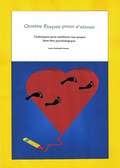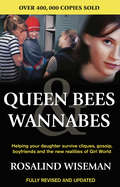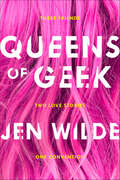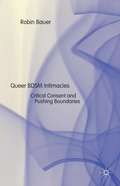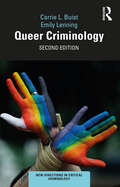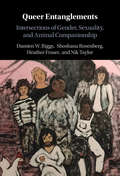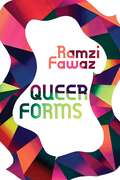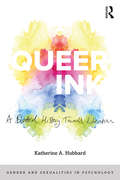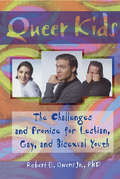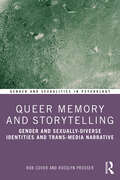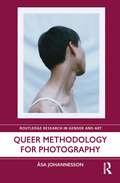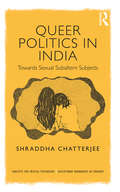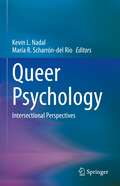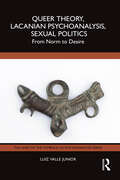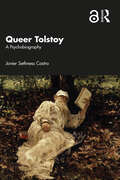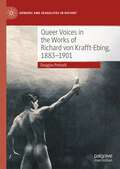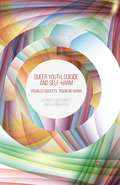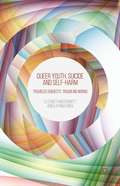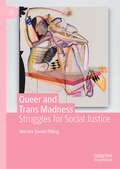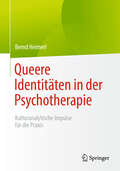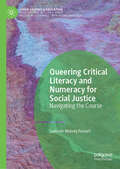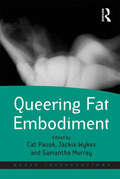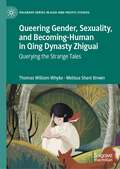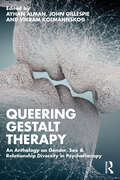- Table View
- List View
Quatre Étapes pour s’aimer. Techniques pour améliorer son propre bien-être psychologique
by Laura Pedrinelli Carrara Sanja AudarLA DESCRIPTION DU LIVRE Il y a les moments dans la vie où nous avons besoin de nous arrêter un instant pour comprendre ce qui se passe. Nous sentons qu’en nous-mêmes ou dans les rapports avec les autres une certaine harmonie s’est altérée ou plus que jamais nous nous apercevons qu’elle n’a jamais existé. Souvent nous nous laissons aller dans les conclusions faciles du style «Personne ne me comprend», «Je ne vaux pas grand chose», « Ils veulent ma peau», « Les autres, s’ils le peuvent, ils abusent », « La seule façon d’être bien serait de s’en aller». En réalité, on ne résout pas les problèmes avec la fugue puisque si on ne défait pas les nœuds, ce sera le retour de bâton, nous devons cependant porter l’attention adéquate à notre façon d’interagir avec les autres et de choisir les protagonistes de nos relations. Le livre Quatre Étapes pour s’aimer. Techniques pour améliorer son propre bien-être psychologique se veut être un petit outil pour commencer à comprendre en mode plus objectif et plus profond quelque chose sur nous-mêmes pour demander la compréhension émotionnelle de nous-mêmes et les modalités pour interagir avec les autres. Notamment on souhaite aider l’individu à améliorer son propre bien-être, le stimulant à évaluer les modes divers de percevoir soi-même et les autres et de gérer ses propres émotions et le stress. Le texte est composé de 4 chapitres intitulés les Étapes parce qu’elles accompagneront le lecteur participant dans le chemin divertissant et enthousiasmant à l’intérieur de lui-même. Dans chaque Étape on pourra comprendre et exprimer soi-même en modes différents, réclamant l’introspection profonde, mais jamais frustrante ou pesante. Les exercices activent l’individu sur le niveau psychocorporel, pour cette raison dans certains cas on doit compléter les phrases et répondre aux questions, dans les autre
Queen Bees And Wannabes for the Facebook Generation: Helping your teenage daughter survive cliques, gossip, bullying and boyfriends
by Rosalind WisemanWhen Rosalind Wiseman first published QUEEN BEES & WANNABEES, she fundamentally changed the way adults look at girls' friendships and conflicts - from how they choose their best friends, how they express their anger, their boundaries with boys, and their relationships with parents. Wiseman showed how girls of every background are profoundly influence by their interactions with one another.Now, Wiseman has revised and updated her groundbreaking book for a new generation of girls living in the age of Facebook, IM and text message..Packed with insights about technology's impact on Girl World and enlivened with the experiences of girls, boys, and parents, the book that inspired the hit movie Mean Girls offers concrete strategies to help you empower your daughter to be socially competent and treat herself with dignity.
Queens of Geek
by Jen WildeThree friends, two love stories, one convention: this fun, feminist love letter to geek culture is all about fandom, friendship, and finding the courage to be yourself."Full of irreverent humor and in-jokes, it’s geeky and funny, with a heavy dose of self-discovery. . . . . Seeing girls and women uplifting, protecting, and loving each other is extremely powerful especially in the context of fandom." —Teen Vogue"This is the geeky, queer book of our dreams." —SeventeenCharlie likes to stand out. She’s a vlogger and actress promoting her first movie at SupaCon, and this is her chance to show fans she’s over her public breakup with co-star Reese Ryan. When internet-famous cool-girl actress Alyssa Huntington arrives as a surprise guest, it seems Charlie’s long-time crush on her isn’t as one-sided as she thought.Taylor likes to blend in. Her brain is wired differently, making her fear change. And there’s one thing in her life she knows will never change: her friendship with her best guy friend Jamie—no matter how much she may secretly want it to. But when she hears about a fan contest for her favorite fandom, she starts to rethink her rules on playing it safe.Queens of Geek by Jen Wilde, chosen by readers like you for Macmillan's young adult imprint Swoon Reads, is an empowering novel for anyone who has ever felt that fandom is family.Praise for Queens of Geek:"This fun book about fierce friendships gives voice to a group of diverse female characters who are so defined by so much more than just their mental health and sexuality." —Bustle"This celebration of geek culture and fandom promotes diversity and being true to oneself." —School Library Journal“[A] fun read about fandom, friendship and the courage to be yourself.” —Autostraddle
Queer BDSM Intimacies
by Robin BauerThis is the first book-length empirical study of lesbian, transgender and queer BDSM practices, identities, relationships and communities. Based on interviews and participant observation, Queer BDSM Intimacies explores various women's and queer BDSM spaces and networks in the USA and Western Europe over a period of five years. While research on alternative forms of sexuality, genders and relationships has been booming recently, the particular experiences and perspectives of this group have yet to receive sufficient attention. Robin Bauer shows that queer BDSM practitioners have created unique social spaces through critical consent-making processes. These spaces are suited to explore not only their own identities beyond common binary categorizations of man/woman and homo/heterosexual, but to create new forms of living, gender, sexuality, intimacy and collectivity. The transgressive nature of BDSM allows them to push their own and social boundaries, engaging with social difference and power dynamics, appropriating them for their own pleasures.
Queer Criminology (New Directions in Critical Criminology)
by Emily Lenning Carrie L. BuistThis book surveys the growing field of Queer Criminology. It reflects on its origins, reviews its foundational research and scholarship and offers suggestions for future directions. Moreover, this book emphasizes the importance of Queer Criminology in the field and the need to move LGBTQ+ issues from the margins to the center of criminological research. Core content includes: • Contested definitions of and conceptual frameworks for Queer Criminology• The criminalization of queerness and gender identity in historical and contemporary context• The relationship between LGBTQ+ communities and law enforcement• The impact of legislation and court decisions on LGBTQ+ communities• The experiences of queer victims and offenders under correctional supervision This revised and updated edition includes new developments in theory and research, further coverage of international issues and a new chapter on victimization and offending. It is essential reading for those engaged with queer, critical, and feminist criminologies, gender studies, diversity, and criminal justice.
Queer Entanglements: Intersections of Gender, Sexuality, and Animal Companionship
by Damien W. Riggs Heather Fraser Nik Taylor Shoshana RosenbergQueer Entanglements provides the first comprehensive account of the intersections of lesbian, gay, bisexual, queer, trans, and non-binary people's lives with the lives of animals. Exploring diverse topics such as domestic violence, grief following the loss of an animal, veganism, cruelty-free makeup products, Pride events, and community activism, the book offers a theoretical and empirical basis for understanding the contexts that bring together human and animal lives. By using real-world examples, it provides a lively and engaging view of what it means to think about the connections between animal and human lives, even when human experiences operate at the expense of animal wellbeing. This critical, intersectional, and interdisciplinary perspective on human-animal relations will be of interest to scholars and students in human-animal studies, psychology, sociology, social work, and cultural and gender studies.
Queer Forms
by Ramzi FawazHow do we represent the experience of being a gender and sexual outlaw? In Queer Forms, Ramzi Fawaz explores how the central values of 1970s movements for women’s and gay liberation—including consciousness-raising, separatism, and coming out of the closet—were translated into a range of American popular culture forms. Throughout this period, feminist and gay activists fought social and political battles to expand, transform, or wholly explode definitions of so-called “normal” gender and sexuality. In doing so, they inspired artists, writers, and filmmakers to invent new ways of formally representing, or giving shape to, non-normative genders and sexualities. This included placing women, queers, and gender outlaws of all stripes into exhilarating new environments—from the streets of an increasingly gay San Francisco to a post-apocalyptic commune, from an Upper East Side New York City apartment to an all-female version of Earth—and finding new ways to formally render queer genders and sexualities by articulating them to figures, outlines, or icons that could be imagined in the mind’s eye and interpreted by diverse publics. Surprisingly, such creative attempts to represent queer gender and sexuality often appeared in a range of traditional, or seemingly generic, popular forms, including the sequential format of comic strip serials, the stock figures or character-types of science fiction genre, the narrative conventions of film melodrama, and the serialized rhythm of installment fiction. Through studies of queer and feminist film, literature, and visual culture including Mart Crowley’s The Boys in the Band (1970), Armistead Maupin’s Tales of the City (1976–1983), Lizzy Borden’s Born in Flames (1983), and Tony Kushner’s Angels in America (1989–1991), Fawaz shows how artists innovated in many popular mediums and genres to make the experience of gender and sexual non-conformity recognizable to mass audiences in the modern United States.Against the ideal of ceaseless gender and sexual fluidity and attachments to rigidly defined identities, Queer Forms argues for the value of shapeshifting as the imaginative transformation of genders and sexualities across time. By taking many shapes of gender and sexual divergence we can grant one another the opportunity to appear and be perceived as an evolving form, not only to claim our visibility, but to be better understood in all our dimensions.
Queer Ink: A Blotted History Towards Liberation (Gender and Sexualities in Psychology)
by Katherine HubbardThis historical interdisciplinary book contextualises the Rorschach ink blot test and embeds it within feminist action and queer liberation. What do you see when you look at an ink blot? The Rorschach ink blot test is one of the most famous psychological tests and it has a surprisingly queer history. In mapping this history, this book explores how this test, once used to detect and diagnose ‘homosexuality’, was later used by some psychologists and activists to fight for gay liberation. In this book the author uses the test in yet another way, as a lens through which we can reveal a queer feminist history of Psychology. By looking closely at the lives and work of some women psychologists and activists it becomes clear that their work was influenced by their own, often queer, lives. By tracing the lives and actions of women who used, were tested with, or influenced by, the Rorschach, a new kind of understanding of gay and lesbian history in Britain is revealed. Pushing at the borders between Psychology, Sociology, and activism, the book utilises the Rorschach to show how influential the social world is on scientific practice. This is fascinating reading for anyone interested in the history of sexuality and Psychology.
Queer Kids: The Challenges and Promise for Lesbian, Gay, and Bisexual Youth
by Robert E OwensPacked to the hilt with living narratives, scholarly research, and problem-solution scenarios, Queer Kids: The Challenges and Promise for Lesbian, Gay, and Bisexual Youth examines the unique challenges faced by today’s homosexual young adults. You’ll learn what modern-day queer kids do to cope, survive, and find understanding in a world riddled with homophobic intolerance. Queer Kids is a lens of clarity that will help the average straight adult--and maybe even the average gay adult--see things from a kid’s point of view. Its detail-oriented, well-wrought chapters will provide you with literally hundreds of stories of young people who are trying to define themselves sexually and emotionally in a society of criss-crossing judgment, stereotyping, anger, and expectation. Aimed at three target groups--counselors, parents, and youth--this book introduces you to a variety of interesting kids, offers you a look at the process of coming out, and helps you grasp the experience of queer identification. Specifically, you’ll read about: queer kids and their families and peers the medical/health care profession’s impact on queer kids the teachers and counselors of gay, lesbian, and bisexual youth how to alleviate harrassment, abuse, withdrawal, and loneliness the effects of familial denial, prejudiced counselors, and standoffish gay adultsBeing a kid is tough--but being a queer kid can be even tougher. Fortunately, Queer Kids is available for students, ministers, teachers, youth- and health-care workers, and especially the friends and families of teens who are working through the personal turbulence that too often accompanies sexual and emotional definition. Guided by its upfront approach and practical resource list of written, computer, and telephone aids, you’ll see that a solution is not as distant as you think. Read it, and relearn what it means to be a kid again.
Queer Memory and Storytelling: Gender and Sexually-Diverse Identities and Trans-Media Narrative (Gender and Sexualities in Psychology)
by Rob Cover Rosslyn ProsserQueer Memory and Storytelling unpacks the ways in which the narrative practices of recounting past experiences play a formative role in formation of identities, cultures, and social change among gender and sexually diverse individuals. Grounded in theoretical research, this work delves into historical accounts, case studies, and draws from the rich tapestry of interviews conducted during extensive LGBTQ+ research studies. It explores the power of memorial storytelling to shape the narratives surrounding gender and sexual diversity, offering profound insights into the role storytelling plays as a deeply subjective, personal, communal, and cultural form of expression. The book introduces a queer perspective that reframes the study of narrative psychology, community history, philosophies of subjectivity and the socio-cultural heritage of LGBTQ+ minority communities. It also focuses on the pivotal role played by memory and reflection found within online coming-up stories and contemporary modes of shared community memorialization. By employing queer theory, ethnographic research, interviews and meticulous media/textual analysis, the book presents new frameworks for comprehending the myriad facets of identity, and investigating what it means to remember and narrate selfhood in the context of social life, actively ‘queering’ the concept of memory. Queer Memory and Storytelling will appeal to academics, researchers and students in psychology, sociology, gender and sexuality studies, and communication.
Queer Memory and Storytelling: Gender and Sexually-Diverse Identities and Trans-Media Narrative (Gender and Sexualities in Psychology)
by Rob Cover Rosslyn ProsserQueer Memory and Storytelling unpacks the ways in which the narrative practices of recounting past experiences play a formative role in formation of identities, cultures, and social change among gender and sexually diverse individuals.Grounded in theoretical research, this work delves into historical accounts, case studies, and draws from the rich tapestry of interviews conducted during extensive LGBTQ+ research studies. It explores the power of memorial storytelling to shape the narratives surrounding gender and sexual diversity, offering profound insights into the role storytelling plays as a deeply subjective, personal, communal, and cultural form of expression. The book introduces a queer perspective that reframes the study of narrative psychology, community history, philosophies of subjectivity and the socio-cultural heritage of LGBTQ+ minority communities. It also focuses on the pivotal role played by memory and reflection found within online coming-up stories and contemporary modes of shared community memorialization. By employing queer theory, ethnographic research, interviews and meticulous media/textual analysis, the book presents new frameworks for comprehending the myriad facets of identity, and investigating what it means to remember and narrate selfhood in the context of social life, actively ‘queering’ the concept of memory.Queer Memory and Storytelling will appeal to academics, researchers and students in psychology, sociology, gender and sexuality studies, and communication.
Queer Methodology for Photography (Routledge Research in Gender and Art)
by Asa JohannessonThis book presents new ways of approaching photographic discourse from a queer perspective, offering discussions on what a queering methodology for photography may entail by drawing links between artistic strategies in photographic practice and key theoretical concepts from photography theory, queer theory, critical theory, and philosophy. With different examples of conceptual perspectives, including representation, formalism, and mediumlessness, it seeks to diversify queer methodology for photography. While primarily addressing photography, this book is entwined with broader philosophical questions concerning identity, difference, and the creations of systems of thought that limit the possibilities of existence to binary categorisation. It proposes a new concept of the photographic image that addresses its materiality, in the form of the poetic and the political, in relationship to a generative principle that is named as a queer quality: the photograph’s ability to voice queer concerns also beyond its role as representation. This book will be of interest to scholars working in photography, art history, queer studies, new materialism, and posthumanism.
Queer Politics in India: Towards Sexual Subaltern Subjects (Concepts for Critical Psychology)
by Shraddha ChatterjeeQueer Politics in India simultaneously tells two interconnected stories. The first explores the struggle against violence and marginalization by queer people in the Indian subcontinent, and places this movement towards equality and inclusion in relation to queer movements across the world. The second story, about a lesbian suicide in a small village in India, interrupts the first one, and together, these two stories push and pull the book to elucidate the failure and promise of queer politics, in India and the rest of the world. This book emerges at a critical time for queer politics and activism in India, exploring the contemporary queer subject through the different lenses of critical psychology, Lacanian psychoanalysis, feminist and queer theory, and cultural studies in its critique of the constructions of discourses of ‘normal’ sexuality. It also examines how power determines further segregations of ‘abnormal’ sexuality into legitimate and illegitimate queer subjectivities and authentic and inauthentic queer experiences. By allowing a multifaceted and engaged critique to emerge that demonstrates how the idea of a universal queer subject fails lower class, lower caste queer subjects, and queer people of colour, the author expertly highlights how all queer people are not the same, even within queer movements, as the book asks the questions, "which queer subject does queer politics fight for?", and, "what is the imagination of a queer subject in queer politics?" This hugely important and timely work is relevant across many disciplines, and will be useful for students of psychology and other academic areas, as well as researchers and activist organizations.
Queer Psychology: Intersectional Perspectives
by Kevin L. Nadal María R. Scharrón-del RíoQueer Psychology is the first comprehensive book to examine the current state of LGBTQ communities and psychology, through the lenses of both queer theory and Intersectionality theory. Thus, the book describes the experiences of LGBTQ people broadly, while also highlighting the voices of LGBTQ people of color, transgender and gender nonconforming people, those of religious minority groups, immigrants, people with disabilities, and other historically marginalized groups. Each chapter will include an intersectional case example, as well as implications for policy and practice.This book is especially important as there has been an increase in psychology and counseling courses focusing on LGBTQ communities; however, students often learn about LGBTQ-related issues through a White cisgender male normative perspective. The edited volume contains the contributions of leading scholars in LGBTQ psychology, and covers a number of concepts – ranging from identity development to discrimination to health.
Queer Theory, Lacanian Psychoanalysis, Sexual Politics: From Norm to Desire (The Lines of the Symbolic in Psychoanalysis Series)
by Luiz Valle JuniorQueer Theory, Lacanian Psychoanalysis, Sexual Politics is a consideration of the relationship between LGBTQIA+ politics, Lacanian psychoanalytic theory, and queer theory.The book argues, through readings of Judith Butler’s Gender Trouble and Lee Edelman’s No Future, that core queer categories – such as normativity and anti-normativity – sidestep questions that are crucial not only to contemporary sexual politics but also to psychoanalytic thinking and clinical work. Luiz Valle Junior attends to the queer account of the political shortcomings of the contemporary LGBTQIA+ movement, as well as to the inadequacies of the queer reception of Lacanian psychoanalysis and makes a case for the ongoing relevance of Lacanian psychoanalysis to thinking through a renewed sexual politics. The book reflects on the potentiality of a Lacanian theory of sexual politics to challenge the dominance of identity in contemporary LGBTQIA+ activism and in the queer theoretical archive. Valle Junior shifts the discussion of sexual politics from the terrain of normativity and identity to the terrain of desire and enjoyment, and questions enduring heteronormative positions that contemporary Lacanians continue to espouse, against Lacan’s own position.Queer Theory, Lacanian Psychoanalysis, Sexual Politics will be of great interest to academics and scholars of queer studies, psychoanalysis, and in the LGBTQIA+ movement, and more broadly in the relation of identity analytics to contemporary psychoanalytic and political thought.
Queer Tolstoy: A Psychobiography
by Javier Sethness CastroQueer Tolstoy is a multidimensional work combining psychoanalysis, political history, LGBTQ+ studies, sexology, ethics, and theology to explore the life and art of Count Lev Nikolaevich Tolstoy. Using a psychobiographical framework, Sethness Castro uncovers profoundly queer dimensions in Tolstoy’s life experiences and art. Deftly contributing to the progressive and radical analysis of gender and sexuality, this book examines how Tolstoy’s erotic dissidence informed his anarchist politics, anti-militarist ideals, and voluminous literary production. Sethness Castro analyzes the influence of Buddha, Socrates, Jesus, Cervantes, Rousseau, Kant, Herzen, Proudhon, Chernyshevsky, and his mother Marya Volkonskaya on the artist's writings. Furthermore, he details Tolstoy's emblematic linking of LGBTQ+ desire with moral and erotic self-determination and resistance to Tsarist despotism—especially in War and Peace. This book is vital reading for those interested in the intersection of literature, psychoanalysis, queer studies, and Russian history.
Queer Voices in the Works of Richard von Krafft-Ebing, 1883–1901 (Genders and Sexualities in History)
by Douglas PretsellThis book is a critical edition of the autobiographical case studies used by the Austro-German psychiatrist Richard von Krafft-Ebing between 1883 and 1901. Forty-one individual case studies of same-sex attracted men and women, in their own words, made an eye-catching component of Krafft-Ebing’s most important work, PsychopathiaSexualis. Although the psychiatrist probably edited the autobiographical case studies, with the racier passages rendered in rather rudimentary Latin, what is particularly remarkable is that he preserved an unmistakeable queer discourse in some of the case studies that disputed the pathologising ideologies of the psychiatric texts in which they were embedded. Most of the autobiographies of same-sex attracted men follow the discursive patterns established in nineteenth-century psychiatry in providing descriptions of body features including genital size and shape, mental and physical health, family histories of health and disease, and accounts of life events from childhood to the present. This was because these men had been following Krafft-Ebing’s works and were now using their autobiographical contributions in Psychopathia Sexualis as a platform for negotiating the parameters of sexual orientation. Women’s sexuality was a relatively undeveloped component of Krafft-Ebing’s sexology but there are four case studies of women containing autobiographical content. Similarly, gender variance was hardly differentiated from sexuality at this period, but there are three autobiographies that clearly articulate cross gender identification, anticipating the future categories of transsexual and transgender. Krafft-Ebing reserved his therapeutic interventions to those individuals attracted to both sexes where hypnosis could supress same sex urges. Seven of these individuals supplied sexual autobiographies with two of them undergoing treatment as part of the overall case study. Together, these forty-one accounts give the reader a window into queer self-conceptions in Austria and Germany as the nineteenth century drew to a close.
Queer Youth, Suicide and Self-Harm: Troubled Subjects, Troubling Norms
by E. McDermott K. RoenOffering a new way of understanding the high self-harm and suicide rates among sexual and gender minority youth, this book prioritises the perspectives and experiences of queer young people, including those who have experience of self-harming and/or feeling suicidal. Presenting analysis based on research carried out with young people both online and face-to-face, the authors offer a critical perspective on the role of norms, namely developmental norms, gender and sexuality norms, and neoliberal norms, in the production of self-harming and suicidal youth. Queer Youth, Suicide and Self-Harm is unique in the way it works at the intersection of class and sexuality, and in its specific focus on transgender youth and the concept of embodied distress. It also examines the implications of this research for self-harm reduction and suicide prevention.
Queer Youth, Suicide and Self-Harm: Troubled Subjects, Troubling Norms
by Elizabeth McDermott Katrina RoenOffering a new way of understanding the high self-harm and suicide rates among sexual and gender minority youth, this book prioritises the perspectives and experiences of queer young people, including those who have experience of self-harming and/or feeling suicidal. Presenting analysis based on research carried out with young people both online and face-to-face, the authors offer a critical perspective on the role of norms, namely developmental norms, gender and sexuality norms, and neoliberal norms, in the production of self-harming and suicidal youth. Queer Youth, Suicide and Self-Harm is unique in the way it works at the intersection of class and sexuality, and in its specific focus on transgender youth and the concept of embodied distress. It also examines the implications of this research for self-harm reduction and suicide prevention.
Queer and Trans Madness: Struggles for Social Justice
by Merrick Daniel PillingThis book urges those invested in social justice for 2SLGBTQ people to interrogate the biomedical model of mental illness beyond the diagnoses that specifically target gender and sexual dissidence. In this first comprehensive application of Mad Studies to queer and trans experiences of mental distress, Pilling advances a broad critique of the biomedical model of mental illness as it pertains to 2SLGBTQ people, arguing that Mad Studies is especially amenable to making sense of queer and trans madness. Based on empirical data from two qualitative research studies, this book includes analyses of inpatient chart documentation from a psychiatric hospital and interviews with those who have experienced distress. Using an intersectional lens, Pilling critically examines what constitutes mental health treatment and the impacts of medical strategies on mad queer and trans people. Ultimately, Queer and Trans Madness: Struggles for Social Justice explores the emancipatory promise of queer and trans madness, advocating for more resources to respond to crisis and distress in ways that are non-coercive, non-carceral, and honour autonomy as well as interdependence within 2SLGBTQ communities.
Queere Identitäten in der Psychotherapie: Kulturanalytische Impulse für die Praxis
by Bernd HeimerlDie Queer-Theorie und die Queer Studies nehmen seit langem Einfluss auf die zeitgenössische psychoanalytische Praxis und die psychoanalytische Theoriebildung. Dabei werden mehr die individuellen klinischen „Fälle“ im Fachdiskurs besprochen und weniger die kulturanalytischen, geschichtlichen und gesellschaftlichen Veränderungen im sog. kulturellen Übergangsraum: In diesem queeren Übergangsraum finden sich individuelle Coming-out- und Coming-in Prozesse als auch kulturelle Aneignungsprozesse, es sind Migrationsbewegungen von einer (geschlechtlichen) Kultur in eine andere. Welche realen und psychischen Übergangsräume schaffen sich queere Personen? Welche Orte finden sie vor, welche werden verlassen, welche ersehnt? Queere Identitäten im Übergang zu betrachten, bedeutet die Transformation von einer Kultur in eine andere, von einer heteronormativen in eine non-heteronormative Um- und Mitwelt. Dieses Fachbuch integriert aus psychoanalytischer Sicht gesellschaftliche und individuelle Aspekte des Themas Queere Identitäten und bietet Psychotherapeut:innen aller Therapierichtungen eine neue Perspektive und übergreifende Ansatzpunkte im Kontakt mit queeren Personen. Das Verstehen queerer (Körper-) Biografien wird gefördert und die Bedeutung für die individuelle Behandlung anhand von kulturanalytischen Denkanstößen praxisnah abgeleitet.
Queering Critical Literacy and Numeracy for Social Justice: Navigating the Course (Queer Studies and Education)
by Summer Melody PennellThis volume explores the value of using queer pedagogy in an interdisciplinary middle school classroom to promote a better understanding of social justice and the social construction of knowledge among students. In the course of the study, which combined student-centered literacy and mathematical inquiries through a social justice lens, students used critical literacy skills to research social justice topics, learned to read numerical data like traditional print text, and created and solved their own math problems. In bringing together critical mathematics and critical literacy through a queer lens, the author offers new ways of thinking that challenges norms and helps students embrace new concepts of learning for the modern era.
Queering Fat Embodiment (Queer Interventions)
by Samantha Murray Cat Pausé Jackie WykesCultural anxieties about fatness and the attendant stigmatisation of fat bodies, have lent a medical authority and cultural legitimacy to what can be described as ’fat-phobia’. Against the backdrop of the ever-growing medicalisation, pathologisation, and commodification of fatness, coupled with the moral panic over an alleged ’obesity epidemic’, this volume brings together the latest scholarship from various critical disciplines to challenge existing ideas of fat and fat embodiment. Shedding light on the ways in which fat embodiment is lived, experienced, regulated and (re)produced across a range of cultural sites and contexts, Queering Fat Embodiment destabilises established ideas about fat bodies, making explicit the intersectionality of fat identities and thereby countering the assertion that fat studies has in recent years reproduced a white, ableist, heteronormative subjectivity in its analyses. A critical queer examination on fatness, Queering Fat Embodiment will be of interest to scholars of cultural and queer theory, sociology and media studies, working on questions of embodiment, stigmatisation and gender and sexuality.
Queering Gender, Sexuality, and Becoming-Human in Qing Dynasty Zhiguai: Querying the Strange Tales (Palgrave Series in Asia and Pacific Studies)
by Melissa Shani Brown Thomas William WhykeThis book offers queer readings of Chinese Qing Dynasty zhiguai, ‘strange tales’, a genre featuring supernatural characters and events. In a unique approach interweaving Chinese philosophies alongside critical theories, this book explores tales which speak to contemporary debates around identity and power. Depictions of porous boundaries between humans and animals, transformations between genders, diverse sexualities, and contextually unusual masculinities and femininities, lend such tales to queer readings. Unlike previous scholarship on characters as allegorical figures or stories as morality tales, this book draws on queer theory, animal studies, feminism, and Deleuzian philosophy, to explore the ‘strange’ and its potential for social critique. Examining such tales enriches the scope of historic queer world literatures, offering culturally situated stories of relationships, desires, and ways of being, that both speak to and challenge contemporary debates.
Queering Gestalt Therapy: An Anthology on Gender, Sex & Relationship Diversity in Psychotherapy
by John Gillespie Vikram Kolmannskog Ayhan AlmanThe first peer-reviewed book of its kind, this important volume addresses a current gap in the field of gestalt therapy: that the practice—and psychotherapy more broadly—still suffers from pervasive hetero- and cis-normativity. This book offers gestalt-therapy-based research and training material on gender, sex, and relationship diversity (GSRD), including chapters on a variety of GSRD issues and how therapists can become more GSRD-sensitive. The contributors position themselves across the whole spectrum of GSRD and offer their voices as an invitation to further queer the gestalt community with diverse content ranging from academic, research-oriented pieces to experiential, reflective perspectives. Featured chapters explore topics including gender-radical clients, sex and sexuality, relationship diversity, integrating GSRD and gestalt therapy, and addressing heteronormativity in gestalt therapy training. Queering Gestalt Therapy is for everyone who is interested in gender, sex, and relationship diversity, especially as they relate to gestalt therapy practice. This book will be especially useful for therapists, supervisors, coaches, and students of gestalt therapy.
